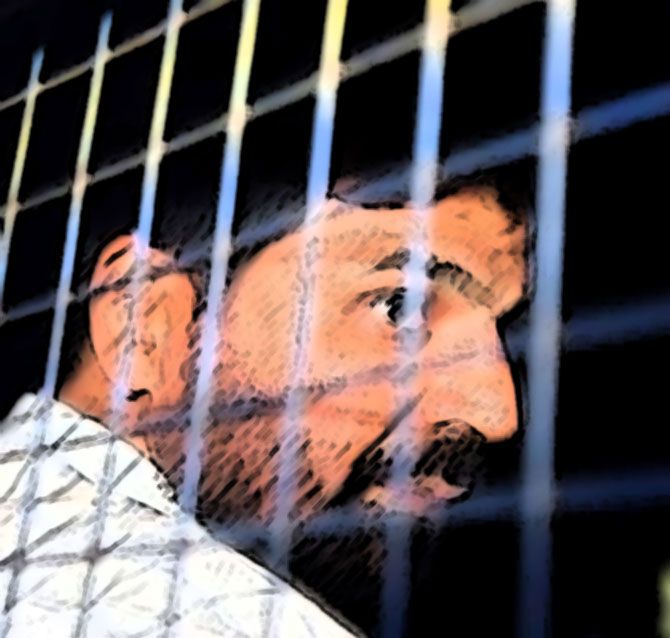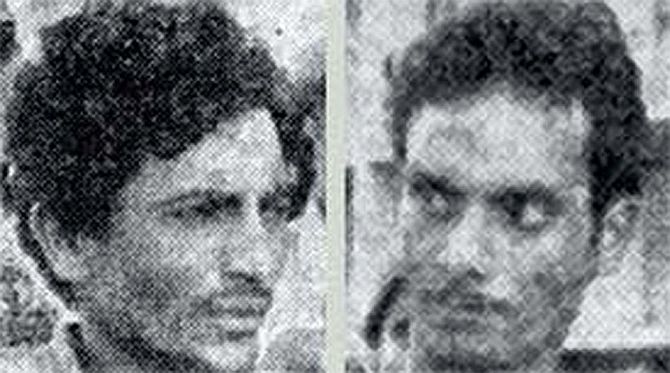
1993 Mumbai blasts convict Yakub Memon was hanged at the Nagpur Central Jail following a day of intense court room action and an unprecedented night-long legal proceeding that saw the Supreme Court hearing and then rejecting his final mercy petition in the wee hours of Thursday morning.
Rediff.com takes a look at some cases from the recent past where the courts awarded the capital punishment for horrific crimes that fall under the rarest of rare category.
Afzal Guru

Afzal Guru was part of a meticulously planned attack on India's parliamentarians by the Jaish-e-Mohammed and the Lashkar-e-Tayiba on December 13, 2001.
The five jihadis had attacked the greatest symbol of India's democratic life. It was termed as a 'war on the IndianState' by the Government of India.
An apex court, in its August 4, 2005 verdict had noted that just before the attack on Parliament, Guru had received calls on his mobile from one of the terrorists, Mohammed at 10:43 am, 11:00 am and 11:25 am.
Guru had also identified the bodies of five terrorists, Mohammed, Haider, Hamza, Rana and Raja, killed during the gun battle by the security personnel inside the Parliament complex.
While upholding his conviction and death sentence, the apex court had relied on the interceptions and recoveries including the mobile phones and the money reached to Guru through hawala transaction with the help of terrorists.
"The circumstances detailed above clearly establish that appellant Afzal Guru was associated with the deceased terrorists in almost every act done by them in order to achieve the objective of attacking the Parliament House," a bench comprising justices P V Reddi and P P Naolekar had said in the judgment.
On February 9, 2013, Guru was hanged and buried in Tihar jail in a secret early morning operation.
Mohammed Ajmal Amir Kasab

A slight figure in cargo pants and sneakers and a blue sweatshirt, gun-wielding Ajmal Kasab was the face of the horrific Mumbai terror attack and the key to unravel the conspiracy hatched in Pakistan.
The images of Kasab ambling cockily -- a backpack on his shoulders and an AK-47 dangling carelessly -- captured on camera at the Chhatrapati Shivaji Terminus on the deadly night of November 26, 2008 formed hard evidence of his ruthless act and eventually led to his conviction.
Kasab, 21 at that time, was the only gunman caught alive after 10 men from Pakistan-based terror group Lashkar-e-Tayiba struck during a 60-hour-siege of the country's financial capital.
Kasab was sentenced to death for attacking Mumbai and killing 166 people on 26 November 2008, along with the nine Pakistani terrorists. He was found guilty of 80 offences, including waging war against the nation, which is punishable by the death penalty.
His death sentence was upheld by the Bombay high court on February 21, 2011. The verdict was upheld by the Supreme Court on August 29 2012. Kasab was hanged until death at 7.30 am in Pune's Yerwada Jail on November 21, 2012.
Dhananjoy Chatterjee

In January 1994, the Calcutta high court sentenced Dhananjay Chatterjee to be hanged until death for raping and then murdering a 14-year-old girl on March 5, 1990 in a flat in Kolkata's Bhawanipur area.
The incident sent a chill down the country's spine, especially because the heinous act had been committed by the security guard of the building where the family of the girl used to live.
Dhananjoy had been convicted on three counts-- Section 302 (murder) Indian Penal Code for which the execution order was given, Section 376 (rape), for which he was sentenced to life imprisonment and Section 380 (theft inside house, for which he was sentenced to five years' imprisonment.
The state government had made a strong case in favour of Dhananjoy’s hanging with even the then late Chief Minister Buddhadeb Bhattacharya's wife, Meera, holding public demonstrations calling for his execution.
But Dhananjoy continued to win reprieves by appealing to the West Bengal governor and twice to the President.
On August 4, 2004, the then President A P J Abdul Kalam rejected Dhananjoy’s mercy petition. The President decided to reject the petition after he had discussions with legal experts, including the then Attorney General Milon Banerji.
Dhananjoy was hanged on August 14, 2004 in the Kolkata jail.
Auto Shankar

In the late 1988s, over a period of approximately six months, nine teenage girls from Thiruvanmiyur, Chennai, disappeared. Initially, investigators believed that the girls had been sold into prostitution by families unable to afford wedding dowries, but consistent denials by their kin forced them to seek another explanation.
Later that year in December, Subalakshmi, a schoolgirl, claimed that an auto rickshaw driver had attempted to abduct her. The cops, working undercover learned of a rumour that an auto driver called Shankar was behind the crimes, disposing of the bodies by cremating them and pouring the remains into the Bay of Bengal.
The following morning, the police picked up the suspect who overnight became the notorious sensation known as ‘Auto Shankar’. Though, initially he blamed on the influence of cinema for the crimes, a month before his execution, he eventually confessed to committing the murders.
Shankar's trial was completed by the Chengalpattu sessions court, where he was sentenced to death along with two of his associates on May 31, 1991.
He was executed by hanging at the Salem Central prison on April 27, 1995.
Joshi-Abdhyankar murders

The Joshi-Abhyankar serial murders were 10 murders committed by Dilip Sutar, Rajendra Jakkal, Munawar Harun Shah and Shantaram Kanhoji Jagtap, all commercial art students of Pune, between January 1976 and March 1977. The quartet frequently robbed two wheelers for money, and indulged in drinking bouts.
On January 16, 1976, they picked up a classmate on a false pretext, and took him to Jakkal’s house where they forced him to write a letter to his father saying that he was leaving on his free will.
They then strangulated him with a nylon rope, put the body in an iron barrel and dumped it into a lake. They then sent a ransom note to the father. On October 31, 1976, the four targeted the family of Achyut Joshi in Pune. They killed the couple and their teenaged son, and then decamped with the loot – a mangalsutra and a few thousand rupees.
On December 1, 1976, the group attacked noted Sanskrit scholar Kashinath Shastri Abhyankar, and killed him with his four family members, and took off with the valuables. On March 23,1977, they killed the younger brother of college friend, and dumped his body in the river.
The killers were apprehended on 30 March 1977. After both the high court and Supreme Courts turned down their appeals, the accused approached the President for a pardon. The pardon was not granted, and the four were hanged at the Yerwada Central Jail on 27 November 1983.
Geeta and Sanjay Chopra kidnapping case

On August 26, 1978, siblings Geeta and Sanjay Chopra, were kidnapped by two men, Ranga Khus (Kuljeet Singh) and Billa (Jasbir Singh), who planned to demand ransom from their parents.
On finding that their father was a naval officer, they dropped the idea. To eliminate evidence, they subsequently murdered Sanjay, raped Geeta and then killed her as well. They then fled the city.
They were arrested on a train a few months later and tried. They testified against each other, and were finally hanged for the crime in 1982.
Nathuram Godse and Narayan Apte

Nathuram Godse and Narayan Apte together decided that Mahatma Gandhi had to be killed. As to who of them first thought of the plot, however, remains a mystery.
The decision was made by the two as they read on the teleprinter the news on Gandhi's decision to go on fast to force the transfer of Rs 55 crore to Pakistan.
In Pune, the two men, Godse and Apte, sitting in their nondescript newspaper office read the news and suddenly made their decision -- Gandhi had to be killed.
Godse resented Gandhi's accommodating attitude to India's Muslims and plotted the assassination with Apte and six others. After a trial that lasted over a year, Godse was sentenced to death on November 8, 1949 and was hanged a week later.
Photograph: Nathuram Godse (left) and Narayan Apte. Image courtesy: Pathe’/videograb










